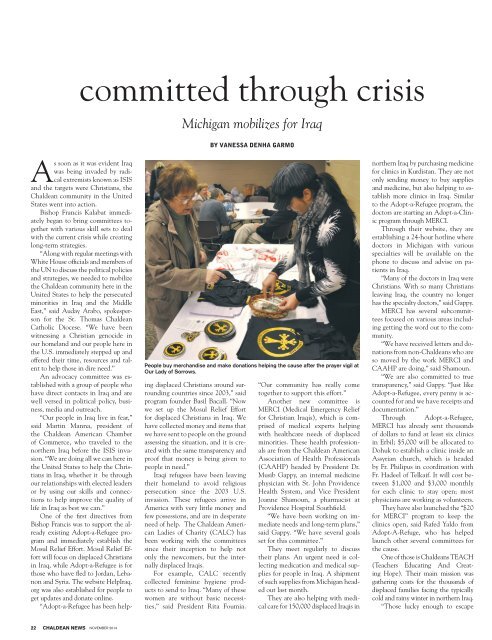You also want an ePaper? Increase the reach of your titles
YUMPU automatically turns print PDFs into web optimized ePapers that Google loves.
committed through crisis<br />
Michigan mobilizes for Iraq<br />
BY VANESSA DENHA GARMO<br />
People buy merchandise and make donations helping the cause after the prayer vigil at<br />
Our Lady of Sorrows.<br />
As soon as it was evident Iraq<br />
was being invaded by radical<br />
extremists known as ISIS<br />
and the targets were Christians, the<br />
Chaldean community in the United<br />
States went into action.<br />
Bishop Francis Kalabat immediately<br />
began to bring committees together<br />
with various skill sets to deal<br />
with the current crisis while creating<br />
long-term strategies.<br />
“Along with regular meetings with<br />
White House officials and members of<br />
the UN to discuss the political policies<br />
and strategies, we needed to mobilize<br />
the Chaldean community here in the<br />
United States to help the persecuted<br />
minorities in Iraq and the Middle<br />
East,” said Auday Arabo, spokesperson<br />
for the St. Thomas Chaldean<br />
Catholic Diocese. “We have been<br />
witnessing a Christian genocide in<br />
our homeland and our people here in<br />
the U.S. immediately stepped up and<br />
offered their time, resources and talent<br />
to help those in dire need.”<br />
An advocacy committee was established<br />
with a group of people who<br />
have direct contacts in Iraq and are<br />
well versed in political policy, business,<br />
media and outreach.<br />
“Our people in Iraq live in fear,”<br />
said Martin Manna, president of<br />
the Chaldean American Chamber<br />
of Commerce, who traveled to the<br />
northern Iraq before the ISIS invasion.<br />
“We are doing all we can here in<br />
the United States to help the Christians<br />
in Iraq, whether it be through<br />
our relationships with elected leaders<br />
or by using our skills and connections<br />
to help improve the quality of<br />
life in Iraq as best we can.”<br />
One of the first directives from<br />
Bishop Francis was to support the already<br />
existing Adopt-a-Refugee program<br />
and immediately establish the<br />
Mosul Relief Effort. Mosul Relief Effort<br />
will focus on displaced Christians<br />
in Iraq, while Adopt-a-Refugee is for<br />
those who have fled to Jordan, Lebanon<br />
and Syria. The website HelpIraq.<br />
org was also established for people to<br />
get updates and donate online.<br />
“Adopt-a-Refugee has been helping<br />
displaced Christians around surrounding<br />
countries since 2003,” said<br />
program founder Basil Bacall. “Now<br />
we set up the Mosul Relief Effort<br />
for displaced Christians in Iraq. We<br />
have collected money and items that<br />
we have sent to people on the ground<br />
assessing the situation, and it is created<br />
with the same transparency and<br />
proof that money is being given to<br />
people in need.”<br />
Iraqi refugees have been leaving<br />
their homeland to avoid religious<br />
persecution since the 2003 U.S.<br />
invasion. These refugees arrive in<br />
America with very little money and<br />
few possessions, and are in desperate<br />
need of help. The Chaldean American<br />
Ladies of Charity (CALC) has<br />
been working with the committees<br />
since their inception to help not<br />
only the newcomers, but the internally<br />
displaced Iraqis.<br />
For example, CALC recently<br />
collected feminine hygiene products<br />
to send to Iraq. “Many of these<br />
women are without basic necessities,”<br />
said President Rita Foumia.<br />
“Our community has really come<br />
together to support this effort.”<br />
Another new committee is<br />
MERCI (Medical Emergency Relief<br />
for Christian Iraqis), which is comprised<br />
of medical experts helping<br />
with healthcare needs of displaced<br />
minorities. These health professionals<br />
are from the Chaldean American<br />
Association of Health Professionals<br />
(CAAHP) headed by President Dr.<br />
Musib Gappy, an internal medicine<br />
physician with St. John Providence<br />
Health System, and Vice President<br />
Joanne Shamoun, a pharmacist at<br />
Providence Hospital Southfield.<br />
“We have been working on immediate<br />
needs and long-term plans,”<br />
said Gappy. “We have several goals<br />
set for this committee.”<br />
They meet regularly to discuss<br />
their plans. An urgent need is collecting<br />
medication and medical supplies<br />
for people in Iraq. A shipment<br />
of such supplies from Michigan headed<br />
out last month.<br />
They are also helping with medical<br />
care for 150,000 displaced Iraqis in<br />
northern Iraq by purchasing medicine<br />
for clinics in Kurdistan. They are not<br />
only sending money to buy supplies<br />
and medicine, but also helping to establish<br />
more clinics in Iraq. Similar<br />
to the Adopt-a-Refugee program, the<br />
doctors are starting an Adopt-a-Clinic<br />
program through MERCI.<br />
Through their website, they are<br />
establishing a 24-hour hotline where<br />
doctors in Michigan with various<br />
specialties will be available on the<br />
phone to discuss and advise on patients<br />
in Iraq.<br />
“Many of the doctors in Iraq were<br />
Christians. With so many Christians<br />
leaving Iraq, the country no longer<br />
has the specialty doctors,” said Gappy.<br />
MERCI has several subcommittees<br />
focused on various areas including<br />
getting the word out to the community.<br />
“We have received letters and donations<br />
from non-Chaldeans who are<br />
so moved by the work MERCI and<br />
CAAHP are doing,” said Shamoun.<br />
“We are also committed to true<br />
transparency,” said Gappy. “Just like<br />
Adopt-a-Refugee, every penny is accounted<br />
for and we have receipts and<br />
documentation.”<br />
Through Adopt-a-Refugee,<br />
MERCI has already sent thousands<br />
of dollars to fund at least six clinics<br />
in Erbil; $5,000 will be allocated to<br />
Dohuk to establish a clinic inside an<br />
Assyrian church, which is headed<br />
by Fr. Philipus in coordination with<br />
Fr. Hadeel of Telkaif. It will cost between<br />
$1,000 and $3,000 monthly<br />
for each clinic to stay open; most<br />
physicians are working as volunteers.<br />
They have also launched the “$20<br />
for MERCI” program to keep the<br />
clinics open, said Rafed Yaldo from<br />
Adopt-A-Refuge, who has helped<br />
launch other several committees for<br />
the cause.<br />
One of those is Chaldeans TEACH<br />
(Teachers Educating And Creating<br />
Hope). Their main mission was<br />
gathering coats for the thousands of<br />
displaced families facing the typically<br />
cold and rainy winter in northern Iraq.<br />
“Those lucky enough to escape<br />
22 CHALDEAN NEWS <strong>NOVEMBER</strong> <strong>2014</strong>

















